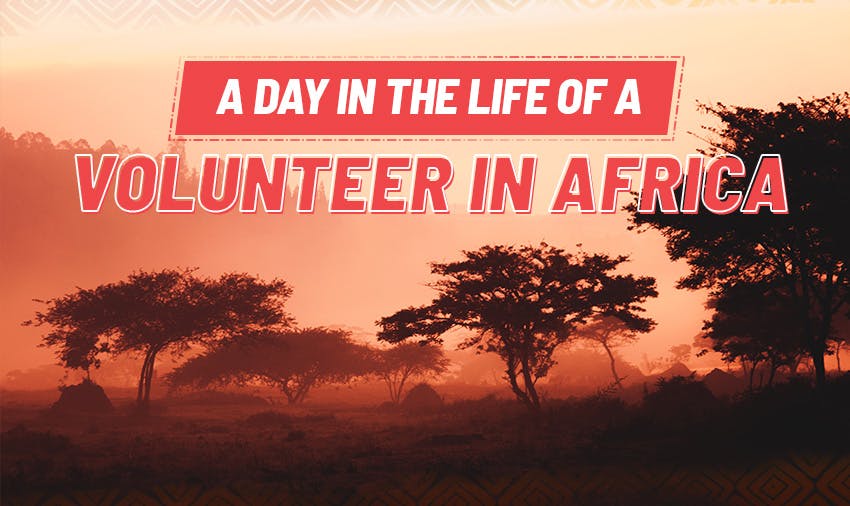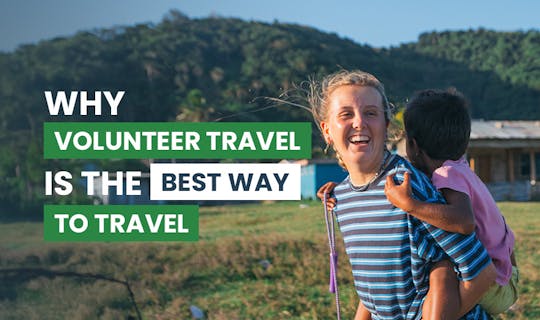This is a day in my life volunteering in a remote Zambian village. Living and volunteering in the village has been one of the most rewarding experiences I have ever had. The rural placement provided me with insight into a significant aspect of Zambian life that I would not have received if I had volunteered in the city. In addition, I lived with a family in the village, allowing me a truly immersive experience. It meant that I continued to spend time with local Zambians and take part in their way of life, even after the school day had ended. After all, school only makes up part of the day. I came to feel like I truly belonged in the community.
“Chimukah!” The sound of my adopted mother barking my name pulls me from my slumber. The softness of the light beginning to infiltrate the room leads me to guess that it is about 5am. She opens the door and greets me with an energetic smile. “Time to get water,” she says. I agree, reluctantly, and get out of bed – a mattress on the floor of my round grass-roof hut. I put on my chitange, a cloth wrap which is the customary attire for women, and retrieve my bucket.
Moureen, my adoptive mother, and I walk together to the borehole, the pump where villagers get water for drinking, cooking and bathing. The family I stay with is lucky; they have a borehole on their own property. Many families must walk or bike for over an hour every day to get water. When we arrive at the borehole some of the neighbors, including Moureen’s nephew and best friend, are there.
The neighbours and Moureen greet one another and they wave to me joyfully; I have been welcomed warmly by everyone here in the village. Moureen and the neighbour joke in Tonga, the local language, while I smile and chuckle as if I understand what they are saying. But the real entertainment begins when I start to pump the water into my bucket. The locals can’t help but laugh hysterically at the sight of a “Muzungu,” meaning non-African, operating the pump.

The pump is quite tiring, and I am relieved when the water begins to spill over the edges. But the relief is brief, as the most arduous part of the task is yet to come. I slowly lift the heavy bucket and place it gently on my head and begin the uphill walk home.
At 21, I would like to think that my physical strength is at its peak but while I struggle with this task immensely, women in the village three times my age complete it multiple times a day and seem to effortlessly balance the bucket on their head hands-free. Meanwhile, I am clenching the sides of the bucket with both hands and still can’t help but allow massive amounts of water to spill over the sides, providing me with a built-in morning shower as I walk up the hill toward the house. As we reach home, I’m huffing and puffing and my back feels as if it’s about to give out.

Soon enough I’m mounting my bike with a bagged lunch in hand and navigating my way through the bush (avoiding the cows along the way) to Makumba Community School. After 30 minutes of pedaling I park my bike and enter the classroom where my Grade 5 students are already waiting for me.
Greeting them enthusiastically we get straight into our lessons, going from math, to English, to science. Despite the language barrier, I’m able to find creative ways to communicate with the kids, and I can tell their English is improving. It’s extremely beneficial for them to be exposed to as much English as possible since upper school will be taught entirely in English.

In Zambia, much of the instruction is performed in lecture style. Teachers read passages from books and students are instructed to copy notes off the board. I’m not a trained teacher, but I’m teaching the best way I know how - by using successful methods my teachers used when I was a student. I invite students to write their answers on the board, plan interactive activities and play academically oriented games. My students are eager to learn and enjoy this style of teaching.
“Team One, Team Two!” One student shouts out at me as I begin writing on the board, indicating that he wants to do board races, a game I taught them last week. I promise him that we will play after the new lesson, and the kids smile and nod their heads up and down, expressing their agreement.
Before I know it, the day’s over and the children lead me to the courtyard where they teach me to grind maize for meals and play netty ball. Before heading home, one of the school teachers invites me to his home, which is near to the school, and offers me snacks and juice.
I spend time chatting with him and his wife, and playing with his 1-year old son. He loves asking me questions about America and is fascinated by the differences in our lifestyles. Many Zambians have never left their country and are intrigued by stories from travellers and volunteers from other countries.
After our chat, I hop on my bike and head home. On the way, I stop to greet Linda, a good friend of the family I stay with, and her children. Precious, her youngest daughter, always runs toward me and offers me a big hug when I arrive. I give her some candy that I have in my bag.
Linda brings me a glass of chibuantu, a traditional drink in Zambia, which is customary to offer to visitors. The drink is ground maize mixed with water, which might not seem as if it would agree with a western palette. But add a few teaspoons of sugar and it’s the perfect afternoon pick-me-up.

The sun is setting and we must cook before it gets too dark. We prepare relish (side dishes of beans, vegetables, or sometimes meat) and shima, the staple food of the Zambians. A Zambian eats Shima, a dough-textured starch made from maize, twice a day, everyday. Although at first glance it could be mistaken for a pot of creamy mashed potatoes, it essentially has no flavour. But I must say, with a good amount of relish it is quite satisfying, and I have genuinely come to look forward to it each night.
We eat on a mat inside the home. I’m always starving by dinner time, but I can never seem to eat fast enough for Moureen’s liking. “Eat, Chimukuh, eat,” she tells me, as I shove Shima into my mouth with my hands (no utensils are used here).
After dinner we clear the mat so that we can rest and chat for a bit. By 8:30pm it’s time for bed. Rest and repeat. After all, tomorrow will be an early start!

On my last day, my family and other village members who I’ve come to know during my time in the village gather for a final meal and a proper farewell. They sing me songs and we dance one final time. It’s one of the hardest goodbyes I have ever experienced. After just four short weeks, this place has truly become my home, and the people my family.
“Don’t forget me Chimukuh!” Moureen called after me as I entered the vehicle that had come to pick me up. I laughed. “I think it would be impossible to forget you, Moureen,” I assured her. “And don’t worry, I will be back!”
Interested in joining IVHQ in a rural village in Zambia? Simply note on your application that you’d like to be placed in the ‘Rural’ project.


